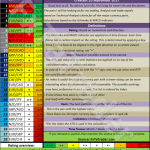Earlier this month, the US Dollar Index broke out to a fresh 14-month high, reaching a peak near 97.00 midway through last week before turning lower in the latter half of the week. Despite the dip over the last couple of days, the bullish trend in the greenback writ large remains well intact, but one pair has been stubbornly lagging.
USD/CHF rallied up to test previous resistance around 1.0050 back in early May, and bulls have made precisely zero progress in the three months since then. So why has USD/CHF struggled to rally, despite general strength in the greenback? From our perspective, there are three main reasons:
1. Increasing Demand for the CHF’s “Safe Haven” Characteristics
Given Switzerland’s conservative finances, large gold holdings, and historical neutrality, the Swiss franc has long been one of the world’s premier safe-haven assets. This means that when investors are wary of negative global economic developments, they tend to sell other higher-yielding, “riskier” currencies and buy the franc…and there have been plenty of reasons for global investors to worry of late.
The escalating trade war between the US and China (which shows no signs of abating despite this week’s low-level discussions), concerns about emerging markets (led by Turkey’s currency collapse), and raising fears of a so-called “hard” Brexit, among other developments, have prompted traders to focus on the return of their capital, rather than the return on their capital.
2. One-Sided Positioning
Despite the fundamental reasons to buy the franc, traders have accumulated a heavy net-short position in the currency. According to the most recent CFTC Commitment of Trader report, speculators have accumulated a net short position in the Swiss franc to the tune of 65,000 contracts, the largest short position in 11 years! At last check, speculators were holding nine contracts held short for every long contract. With the bullish USD/CHF trade already more crowded than it’s been in over a decade, USD/CHF may struggle to find new buyers in the near-term.









Leave A Comment